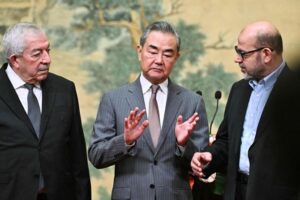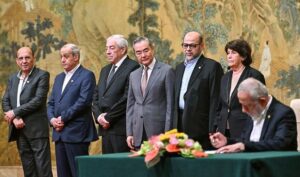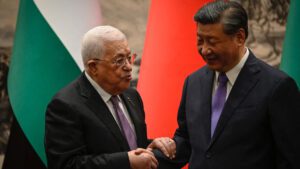14 Palestinian factions, including major rivals Fatah and Hamas, have signed the Beijing Declaration, marking a significant step toward ending longstanding divisions and fostering Palestinian unity. The declaration was signed on July 23, 2024, concluding a pivotal three-day reconciliation dialogue held in Beijing from July 21-23. This unprecedented agreement highlights China’s growing influence in Middle Eastern diplomacy and its commitment to supporting Palestinian reconciliation.

Formation of Interim National Reconciliation Government
One of the primary outcomes of the Beijing Declaration is the establishment of an interim national reconciliation government. This new governance body is designed to oversee the administration of Gaza following the recent conflict. The creation of this government aims to unify the disparate Palestinian factions and provide a cohesive approach to governance and reconstruction in the Gaza Strip.
China’s Role and Diplomatic Efforts
Chinese Foreign Minister Wang Yi, who attended the closing ceremony of the dialogue, praised the agreement as a crucial milestone for Palestinian unity. Wang emphasized that while the reconciliation is fundamentally an internal matter for the Palestinian factions, international support is essential for achieving lasting peace and stability. This event further cements China’s role as a significant mediator in international conflicts, following its earlier success in facilitating Saudi-Iranian reconciliation.
Fatah and Hamas: A History of Rivalry
The agreement comes after years of intense rivalry between Fatah and Hamas. Since Hamas’s decisive victory in the 2006 elections and subsequent control of Gaza in 2007, the factions have been embroiled in conflict. This new reconciliation effort represents a serious attempt to overcome nearly two decades of disputes and division. The April 2024 meeting in Beijing, which laid the groundwork for this reconciliation, was a critical precursor to this recent achievement.
International Reactions and Support
The Beijing Declaration has been met with widespread international support, underscoring the global community’s interest in fostering Palestinian unity. The Palestinian factions’ agreement is seen as a positive development for Middle Eastern stability and has been praised by various international observers and stakeholders. The commitment to form an interim government reflects a serious intention to address the governance and reconstruction needs of Gaza.

Pakistan Prime Minister Sharif’s Response
Prime Minister Sharif welcomed the Beijing Declaration as a significant diplomatic achievement. In a statement on X (formerly Twitter), he praised China for its role in bringing Palestinian factions together and urged the international community to pressure Israel to end its military actions in Gaza. Sharif emphasized that the Palestinian people have endured significant hardship and that the new agreement brings hope for lasting peace.
Pakistan’s Stance on the Israeli-Palestinian Conflict
Pakistan has consistently supported the Palestinian cause, advocating for an independent Palestinian state based on pre-1967 borders with East Jerusalem as its capital. Since the escalation of the conflict with Israel in October 2023, Pakistan has raised concerns at the United Nations and called for an end to Israeli military actions in Gaza. The country does not recognize Israel and maintains that Palestinian unity is essential for achieving peace and justice.
Previous Efforts and Renewed Hope
Earlier in April, leaders from Hamas and Fatah met in China to discuss reconciliation efforts, reflecting ongoing attempts to resolve nearly two decades of disputes. The recent Beijing Declaration is seen as a major step forward, rekindling hope for a unified Palestinian front.

The signing of the Beijing Declaration represents a historic step toward Palestinian unity and reconciliation. By bringing together 14 Palestinian factions, including Fatah and Hamas, China has played a pivotal role in facilitating this important agreement. The formation of an interim national reconciliation government and the broad international support for this initiative signal renewed hope for stability and peace in the Middle East. As the interim government begins its work, the global community will be closely watching to see how these efforts contribute to achieving long-term unity and addressing the needs of the Palestinian people.
Related stories:
China’s Diplomacy in Israel-Gaza Crisis: A Cautious Stance Amidst Western Rush
China Assumes UN Security Council Rotating Presidency, Pledges to Push for Gaza Cease-Fire
China urges for Peace Conference amid Gaza Crisis
















